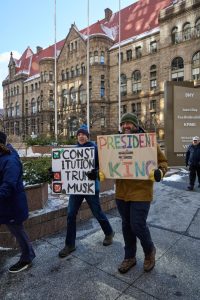Judging Java: The Unionization of Starbucks
September 7, 2022
This week’s Judging Java is going to be a little bit different. Instead of a traditional coffee review, I’d like to talk about something that is happening in the city of Pittsburgh that’s not just disrupting the coffee industry, but is also downright historic: the unionization of Starbucks employees.
Now, some of you reading this may be upset at me for making this coffee review column political. In response to that, I would point out that in the third edition of this column I said “if America runs on Dunkin’ then it’s no wonder that America is so terrible,” although to be fair that was the week of the election. Regardless, I feel as though the recent unionization efforts within the coffee industry are important, and that it is essential for me to discuss them in this column.
It’s no secret that over the past two years, labor unions have seen a huge rise in support, both in terms of people joining them as well as support from the general public. Many economists point to the pandemic as the cause of this. However, something that I think many economists miss is that the pandemic did not cause the problems that led to unions gaining strength, rather it exposed massive societal flaws, especially in the service industry, that had existed and grown worse for decades. The pandemic took things that were already unfathomably flawed and exploded them.
While some Starbucks stores have a history of unionization, both attempted and moderately successful dating back to the 1980s, the main unionization drive currently ongoing began in late 2021, at a store in Buffalo, New York. That shop and nearby shops joined what is now known as Starbucks Workers United.
At the time, Starbucks launched a huge campaign to stop the efforts. Because union busting is illegal, Starbucks billed this campaign as a “listening tour” and forced employees at these stores to attend seminars where they instructed employees to vote no on forming a union.
Tactics like these are common, and have also been used by other major companies. For example, Amazon, who in June of this year had labor organizers arrested and fired for distributing fliers outside of one of their distribution centers. The thing about these tactics is that they are, realistically, illegal. Unfortunately, companies like Amazon and Starbucks have lawyers the size of a CVS receipt, so they’re able to get away with this behavior.
In Pittsburgh, there’s been a huge effort of stores joining the Starbucks Workers United. This makes me very proud to see, especially considering the deep, historic roots of unionization within this city. If you call yourself a Pittsburgher but don’t support unionization then you aren’t one.
Starbucks has taken notice of these efforts, and recently fired two employees at a local Starbucks for “tardiness.” These employees were heavily involved in the unionization efforts, and pointed out publicly that many of their coworkers have much longer histories of being late without even receiving a write up. They were only nine minutes late.
In general, I believe that it is very important for all of us to support our fellow Pittsburghers through their fight for unionization, not just in the coffee industry, but everywhere. I had the chance to see one of the main local Starbucks organizers speak over this summer, and he has a wonderful quote that I think is very applicable: “if you have a boss, then you deserve a union.”
Thank you, to those of you who stuck around to read this column through my political ramblings. I promise that next week this will be back to the traditional format. In the meantime: solidarity forever.

















